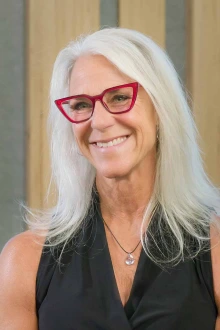Beth Meyerson receives humanitarian award for service
Beth Meyerson, PhD, MDiv., is the 2024 recipient of the Lenn Ditmanson Humanitarian Award, an annual prize that honors those who serve the community by helping people impacted by addiction.

Beth Meyerson, PhD, MDiv
Meyerson, a professor in the Department of Family and Community Medicine, is the director of the Harm Reduction Research Lab, the policy director of the Comprehensive Center for Pain and Addiction and faculty of the U of A’s LGBTQ+ Institute. She received multiple nominations for the award by community, medical and research collaborators across the United States.
The award was established to honor the life and legacy of Ditmanson and recognizes the work of those who, like Ditmanson, work collaboratively to meet the needs of people with substance use disorder. Ditmanson, who died in 2022, graduated from the Mayo Medical School in Rochester, Minnesota, and attended the University of Arizona for his residency. He was a health care provider in Tucson for almost 40 years.
Meyerson called Ditmanson a pioneer in the area of humanitarian approaches for substance use disorder treatment.
“He was a team-oriented guy who was truly beloved by his patients and colleagues alike,” said Meyerson, who received the award in September. “There was not a dry eye in the place when his colleagues and family spoke about the intense loss and deep gratitude they felt for knowing this special person. That I was even considered in Lenn’s league is an honor I will cherish for the rest of my life. Our work takes a village, and I’m grateful to be part of this village that seeks to build the evidence edifice for change to improve the lives of people who use drugs and/or who live with opioid use disorder.”
Nominators referred to Meyerson as a “change maker” and “a force of nature.” In one letter, the nominator praised Meyerson for her ability to “cultivate a movement of genuine compassion, spirit and humanitarianism while providing research to prove why harm reduction is saving lives across the country.”
The award comes with a scholarship for continuing education, and Meyerson said she plans to send undergraduate and graduate students to weeklong training in either implementation science or community-based action research.
Criteria for the award included providing support and mentorship to upcoming health care professionals serving at-risk populations, as well as professionals who demonstrate a dedication to vulnerable groups. Of all the elements, Meyerson said she believed humanity was the most important consideration for the honor.
“I always tell my students and those I mentor that the most important thing is not what you know or what you can do, but that you are a good human as you work with others,” said Meyerson, who joined the U of A in 2019. “In the end, we remember how people and teams make us feel, not whether they were superstars in this or that. I am surrounded by great humans from all walks of life who are committed to making important change for the benefit of others.”

